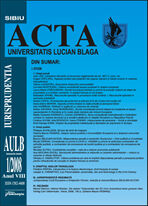Rezoluţiunea contractului - remediu subiectiv sau obiectiv?
Termination of the agreement – a subjective or objective remedy?
Author(s): Luiza Cristina GavrilescuSubject(s): Law, Constitution, Jurisprudence
Published by: Universul Juridic
Keywords: resolution; imputability; failure to enforce; damages and interest; unforeseeable circumstances.
Summary/Abstract: Traditionally, the debtor's wrongful conduct was highlighted as one of the elements of differentiation of the resolution from other causes of termination of contracts. The consideration of guilt as an essential condition to invocate the resolution was founded on its classification as a special form of contractual liability. The configuration of the institution of resolution in the new Civil code clearly reflects the autonomy of this measure. The claim for granting damages and interest, which is based on the presumed fault of the debtor in the event of failure to enforce, may be made with the title of separate or complementary measure, by that relating to the resolution of the contract. Neither the assessment that the debtor's fault is required in order to delimit the scope of the resolution, compared to that of carrying the risk of the contract, can not be accepted. Even if the proof of existing of certain exemption causes excludes the incidence of resolution, this is due to the removal of the causal link between the failure to enforce and the creditor's right to obtain fulfillment of the obligations. Moreover, if the impossibility of performance, due to unforeseeable circumstances, is only partial, the regulations on the field of resolution become incidents.
Journal: Acta Universitatis Lucian Blaga. Iurisprudentia
- Issue Year: 2014
- Issue No: 01
- Page Range: 161-171
- Page Count: 11
- Language: Romanian
- Content File-PDF

